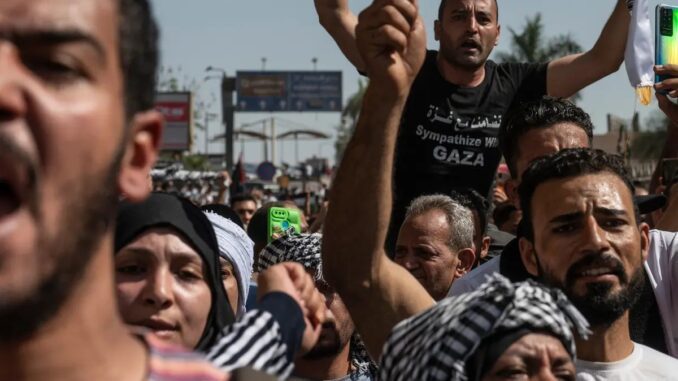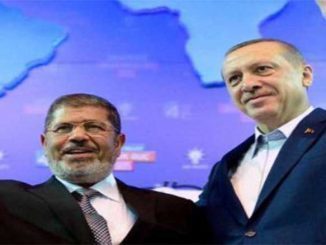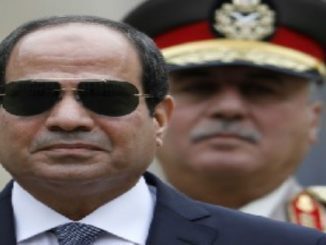
The Israeli war on the Gaza Strip has sharpened the Egyptian popular grievances, both on Palestine and at home, states the Guardian
Israel’s unfolding genocide in Gaza is shaking relations between states and citizens across the Middle East. In Egypt, events have pushed the political regime’s comfortably obscured cooperation with Israel into the limelight and have jolted millions of Egyptians out of their inward focus on daily survival amid spiraling inflation and unemployment, writes Reem Abou-El-Fadl, a senior lecturer in comparative politics of the Middle East at Soas, University of London, in a recent opinion article published by the Guardian.
They are now confronted with Israeli plans to recolonise Gaza using Egypt as a conduit by forcing Palestinians south into Sinai. Both the Egyptian state and its citizens reject this vehemently, but for different reasons. These differences reflect a chasm between the regime and the population opened by the signing of the Camp David accords in 1978, which events are widening further by the day, Reem Abou-El-Fadl added, continuing:
Egyptians have a long history of support for the Palestinian cause, in the context of a shared Arab national identity. The public first opposed the Zionist colonisation project in the 1930s, and the army fought in the 1948 Palestine war. In the 1950s, Egypt’s president, Gamal Abdel Nasser, offered state support to the Palestinians and secured a political victory after the attack by Israel, Britain and France in 1956, but suffered defeat in the 1967 war with Israel. His successor, Anwar Sadat, secured an early victory in the 1973 war, when Egyptian troops crossed the Suez Canal to liberate Sinai, and Israel was only able to regain its balance after an airlift of US arms.
Nevertheless, Sadat later turned the Egyptian state towards “normalisation” with Israel. The population was incentivised away from protest by the US aid offered in return for what became the 1979 peace treaty between Egypt and Israel. Meanwhile, Palestinians lost their centrality in Egyptian public discourse and were even smeared by some as responsible for their own misfortune.
For more than 40 years, successive Egyptian regimes worked to establish Israel’s presence as a fact of life. The justification was Sadat’s claim that “the US holds 99% of the cards in the Middle East”, and that it was, therefore, futile to resist. The aim was to undo years of political, social, and cultural intimacy between Egyptians and Palestinians, who were united in resistance to British colonialism years before Israel was founded.
This was never a successful project, however, and demonstrations in solidarity with Palestinians would continually erupt. The savvy leadership of Hosni Mubarak allowed these protests in order to distract people from their domestic woes. Yet eventually, they prepared the ground for the January 2011 uprising against him.
Under current president Abdel Fatah al-Sisi, all mass gatherings have been banned. Egyptians have been prevented from voicing their sympathies for the Palestinians while being told to focus on making ends meet. As some have shrewdly observed, this left Egypt a regional anomaly, with no solidarity demonstrations during the Palestinian uprising of May 2021.
This was not so in October 2023, however: Israel’s violent impunity has triggered a popular reaction in Egypt that cannot be contained. For Egyptians, the events of 7 October signified the Palestinians breaking their siege, which pierced the steady news stream of abuses, detentions, executions, and land grabs in Jerusalem, the West Bank, and Gaza.
Egyptians then felt a sense of impotence as the bombardment began, particularly given their geographical proximity to Gaza. Israel has repeatedly bombed the Rafah crossing on the Egypt-Gaza border and obstructed aid convoys getting through. As the flow of devastating images continues, Egyptians’ grief and fury have mounted. Mosques host continuous prayers for the dead, becoming spaces for a collective processing of the horrors unfolding.
This powerful wave of sympathy has developed into a desire for active support. In Egypt’s stifled political atmosphere, many have turned to the tool of boycott, targeting western companies known to support Israel. For Egyptian youth in particular, Israel’s brutality and the west’s staunch support have been a wake-up call.
Ever since the Camp David accords, many young Egyptians have looked to western popular and consumer culture, rarely questioning the credibility of the political language of human rights and democracy. Almost overnight, these myths have been shattered for millions of Egyptians, as they watch the endorsements of Israel flow out of Washington, Brussels and London, while the carnage in Gaza goes on. Some of those working in the NGO sector are reportedly debating the alternatives to western funding, and expressing profound unease at their dependence on it.
The same goes for many Egyptians’ understanding of the complicity of regional powers, particularly signatories of the Abraham accords such as the United Arab Emirates, and Saudi Arabia, which had been preparing its own agreement. A recent arts festival in Riyadh was boycotted by Egyptian artists; those who went were heavily criticised.
This month, the Egyptian Journalists Syndicate began organising a Palestine event featuring songs from the popular resistance of Suez in 1956. It has since launched the “world’s conscience convoy”, calling for an international coalition of volunteers to go to Rafah to pressure Israel into letting more aid through and demand an end to the war. Needless to say, both before and since the temporary truce, Egyptian public opinion opposes the Sinai plan as a new stage of ethnic cleansing in Palestine.
This is the atmosphere of mobilisation and frustration that envelops the Egyptian regime. The leadership has its own longstanding concerns that Israel wants to “export” the conflict to Egypt – these were confirmed by the leak of an Israeli intelligence document dated 13 October, proposing the “transfer” of Gaza’s Palestinians to the Sinai peninsula.
This would mean housing thousands of refugees, and poses the risk of attracting Egyptians to the ranks of Palestinian armed groups, inviting Israeli strikes, or worse. Enjoying full US backing, Israel has exercised pressure on Egypt to accept, but Sisi has called Arab summits and spoken with US and European leaders, each time repeating the message of refusal.
The regime has tried to achieve this with the help of the Egyptian people. On 18 October, without any irony, the president said “millions” could be mobilised to resist US-Israeli pressure.
Designated locations were soon shared online. Sisi planned to use this to absorb popular anger, and to send a message to the US, the EU and Israel that he simply could not accept the Sinai plan without risking his position.
As it happened, many who participated ended up going off script, heading for Tahrir Square. Some even chanted the 2011 uprising slogan, “Bread, freedom, social justice”, and insisted: “This is a real demonstration, not a mandate for anyone.” Police made more than 100 arrests, and Tahrir Square has since been fortified with armoured vehicles.
Still, figures such as Al-Azhar Sheikh Muhammad Al-Tayyib have spoken out, endorsing Palestinian resistance, and demanding a re-evaluation of Egypt’s relations with the west.
The popularity of Palestine is such that the regime was able to harness it – despite its own record – for domestic and diplomatic leverage. Yet this popularity means it must also stay ahead of the curve, whether by containment or repression, lest Palestine activism boil over into domestic protest as it has done before.
In the absence of organised opposition, this process may take years to develop, but there does appear to be a sense in which the lessons of the day – distinguishing friend from foe, truth from lies, power from resistance – are sharpening popular grievances. According to a friend, Egyptians are scrutinising themselves after years of post-revolutionary defeat: “We are like someone rising to their feet, after a hard blow.”



